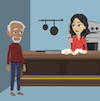Subordinating Conjunctions - Time Words

Conversation
Woman: How should I make this omelet?
Man: Well, first get two eggs and crack them in a bowl.
Woman: OK, what should I do next?
Man: After you crack the eggs, you must whisk them up.
Woman: Alright. How long should I whisk them for?
Man: Whisk them until they are evenly blended.
Woman: OK, what should I do next?
Man: Well, actually, before you cook the eggs, you should chop up some ham and grate some cheese.
Woman: OK, I can do that. Is that all I should add?
Man: No, you should chop up some onions and tomatoes too. While you are chopping them up, you can preheat the pan. Add a little butter once the pan starts to heat up.
Woman: Got it. Add the butter when the pan gets hot.
Man: Once you do that, you can put the eggs in the pan. By the time you put the eggs in, the butter will be melted.
Woman: How long should I cook them for?
Man: Cook the eggs until they start to bubble. As soon as they start to bubble, you need to flip the omelet.
Woman: OK, and when do I add the ingredients?
Man: You can add the cheese, ham and vegetables after you flip the omelet.
Woman: Great, and what do I do after that?
Man: As soon as the cheese starts to melt, you can fold the omelet. Then is it is ready to serve.
Woman: Great! What should I do then?
Man: Well, once you finish the omelet, you can call me. I'm getting hungry, so by the time you finish making two omelets, I'll be ready to eat.
Woman: OK, sounds good, but only if you clean up after we eat.
Man: Deal.
Subordinating Conjunctions of Time
- The meeting started before we got there.
- He left by the time we arrived.
- Call me when you get home.
- I will call you after I finish.
- I wake up before the sun rises.
- She does yoga before she goes to work.
- My boss is in the office by the time I get there.
- I should be there by the time you arrive.
- I fee sad when it rains.
- She calls me as soon as she home.
- Flip the pancake once it starts to bubble.
- Please stay here until I call you.
- I called her after I got home.
- I saw him as soon as the meeting ended.
- I saw him right after the meeting ended.
- I saw him just after the meeting ended.









